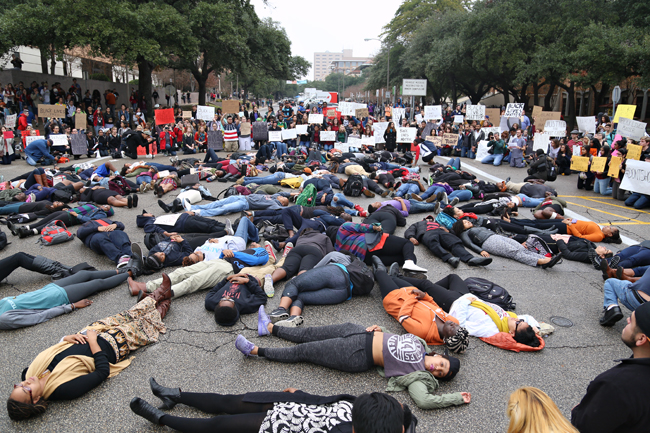UT students staged a “die-in” Thursday afternoon at the intersection of 21st Street and Speedway to protest the Eric Garner ruling.
At the demonstration, black students performed a die-in, where they laid down as if they were dead, while non-black supporters kneeled around them with signs reading “BLACK LIVES MATTER.” The actions were meant to protest the non-indictement of Officer Daniel Pantaleo in Garner’s death, a decision that was passed down by a Staten Island grand jury Wednesday.
Tyler English-Beckwith, theatre and dance and ethnic studies junior, made the die-in Facebook event Wednesday night. With a large crowd and over 500 Facebook users marked as “going” on the event page, English-Beckwith was astounded by the turnout despite the short notice.
“I think what we made collectively was an extremely organized demonstration,” English-Beckwith said. "I didn’t imagine this many people at all. I was thinking like maybe 15 people since it was so last-minute.”
Biology junior Julia Aycock said she participated to advocate for fair treatment.
“I came to the protest because it’s necessary for young people to gather and stand for what’s right,” Aycock said. “A lot of people of color — more specifically for this issue, black people — they don’t really understand that racism still exists. Everybody is living in this big state of denial and nobody wants to talk about what the real problem is.”
Charles Gee, an applied learning development senior, said the demonstration will bring awareness of racial mistreatment to the campus.
“I saw solidarity,” Gee said. “I saw people being unified and acknowledging that there are issues that are going on in the world, specifically in the black community. [This die-in will] make people more aware of what’s going on around us that’s right in our face.”
According to English-Beckwith, social media will continue to help minority groups receive justice.
“This [injustice] has been happening,” English-Beckwith said. “This is not anything that’s new. I think what’s happening now is that we have the technology to say, ‘Listen, we saw this, and we can spread the word about these things happening.’
[Offenders] can no longer cover it up anymore. We see what [they’re] doing, and we are going to make sure that [they] know we see [them].”
English-Beckwith said she believes police officers are using the excuse of fear to cover up their actions.
“What we’ve seen now is that [police are] saying that they feared for their lives,” English-Beckwith said. “What’s beneath that fear is a justice system that promotes that racial prejudice. Mike Brown’s black skin was that weapon, and it’s not fair. We’re not going to stand for it anymore.”




















